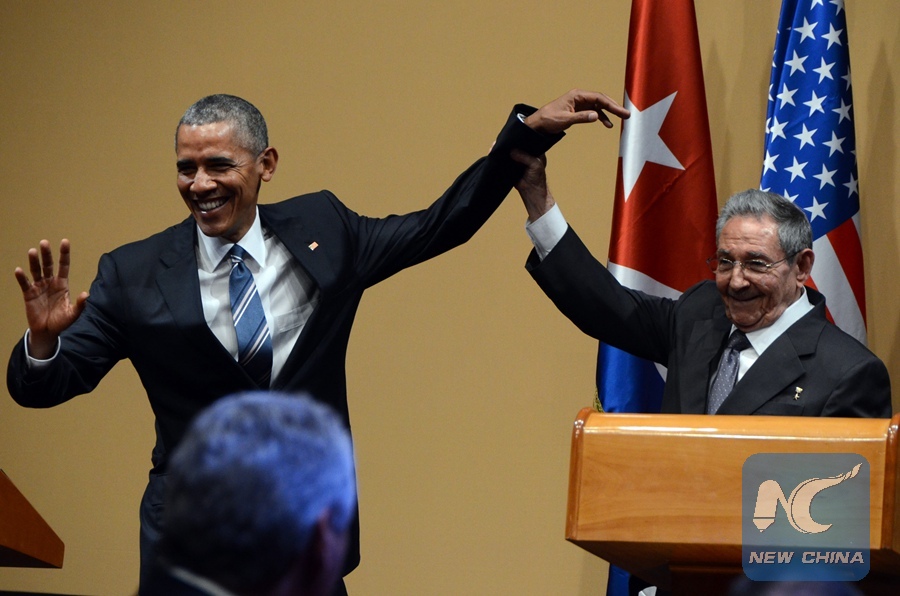
United States President Barack Obama (R) and his wife Michelle Obama (L) arrive at Jose Marti Airport in Havana March 20, 2016. (Xinhua/Joaquin Hernandez)
by Raimundo Urrechaga, Noemi Galban
HAVANA, July 15 (Xinhua) -- Nearly a year since Cuba and the United States formally restored diplomatic ties, the two former adversaries have inched closer to establishing a normal relationship.
The two countries made history on July 20, 2015 by reopening their respective embassies. But while bilateral ties have seen no more major breakthroughs since Obama's visit to Cuba in March, 2016, the two former adversaries appear to have settled into a relationship of respectful coexistence, a development that may be just as valuable in the long run, according to a Cuban analyst.
Jesus Arboleya, a professor at Cuba's Higher Institute of International Relations, spoke with Xinhua about how the process of rapprochement between the two countries has evolved since they first announced on Dec. 17, 2014 their decision to normalize ties after more than five decades of hostility.
In contrast to decades of cold-shoulder exchanges, Cuban and U.S. delegations have traveled to each other's countries for direct talks on a range of matters and on an equal footing, noted Arboleya.
These face-to-face encounters facilitate dialogue and minimize the chances of misunderstandings, he said, though negotiating with a power such as the United States necessarily requires a degree of caution.
"It is the first time that we see ties marked by respect and they will remain that way to the extent that Cuba demands it. The first chance the United States has to reestablish Cuba's dependence, it (the U.S.) will take it, and in fact that is what it hopes to do," warned Arboleya.

Honored guests wait to attend Karl Lagerfeld's "Cruise" line for Chanel at the Paseo del Prado street in Havana, Cuba, May 3, 2016. (Xinhua/Liu Bin)(dh)
Washington's tendency toward domination largely defines White House policy, not just toward Cuba, but also the rest of the world, he said, so bilateral ties will always be fraught with difficulties.
Much depends on Cuba and its ability to preserve social and political stability, improve its economy and strengthen international ties.
"Some Cubans see this process (of rapprochement) as toxic to Cuban socialism. It could be, that depends on how we handle it. But without a doubt it is a situation that offers Cuba an economic respite, while politically it is viewed as a victory for Cuban resistance," said Arboleya.
Even Obama, he noted, acknowledged that Washington's aggressive, outdated and long-running policies toward Cuba had failed, requiring a new strategy to achieve its hidden goal of regime change in the Caribbean island.
"Cuba is going to win and lose in its relationship with the United States, just as the United States is going to win and lose in its relationship with Cuba. The challenge is to take advantage of the opportunities that this new juncture provides and strike a new balance, which I believe is going to be positive for both countries," said the scholar.
The two countries have already reached a handful of agreements in the areas of environmental protection, fighting drug trafficking, terrorism and human trafficking, health care and telecommunications, among others.
And both stand to benefit from accessing each other's markets, though the ongoing trade embargo against Cuba impedes real progress in that area.
The positives so far outweigh the negatives, noted Arboleya.
"The new situation also curbs more aggressive U.S. actions towards Cuba, such as terrorism and a military invasion," he said. "I'm not saying they can't happen under certain circumstances, but (the current climate) considerably limits the chances."

People watch U.S. cruise ship Adonia arriving in Havana, Cuba, May 2, 2016. (Xinhua/Liu Bin)
Still, obstacles to improved ties remain, including the embargo, the U.S. occupation of Guantanamo, where it operates a naval base and notorious prison, U.S. immigration policy towards Cubans, and so-called "democracy promotion" programs that aim to topple the Cuban government.
Another bump in the road to better ties may be the weakening of Latin America's leftist governments, whose defense of Cuba largely pressured Obama into changing tack, said Arboleya.
"Today, the Latin American scenario that served as the basis for the new policy toward Cuba has changed, and it is also going to be a source of conflict," he said.
What about the changing political landscape in the United States?
The academic dismissed the idea that the outcome of upcoming presidential elections in the United States may have a decisive influence on how bilateral ties develop.
"The process has gone relatively well and the foundations have been built, making it difficult for whoever wins the elections in November to reverse it," he said, though "establishing business with large companies" would do more to protect ties from being dismantled.
Ultimately, Cuba's future is in the hands of new generations, he said, noting Cuban President Raul Castro has announced he will be stepping down from power, marking the end of an era and paving the way for younger leaders.
"In 2018 there is going to be a generational change in Cuba's political leadership and we will have to begin a new chapter," said Arboleya.

